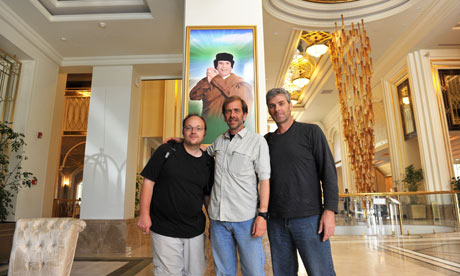No freedom for foreign press at Tripoli's Rixos hotel
It may be a five-star luxury hotel but for the foreign journalists trying to cover the Libyan conflict Tripoli's Hotel Rixos is a world of paranoia, manipulation and frustration

Journalists at the Rixos. Photograph: AFP
The call sometimes comes in the middle of the night. Pack your bags, you are being deported. Or: we would like to discuss an error in your story – now. Or even: we have news about your visa inquiry. One evening, a list of 25 names was posted in the hotel lobby. The following journalists will be leaving tomorrow. No reason, no discernible pattern. The next morning, all were reprieved. Bags were unpacked, travel arrangements unpicked.
This is part of life as a foreign journalist under virtual house arrest at the five-star Rixos hotel in Tripoli, where maddening soft pop plays on an endless loop, portraits of the Brother Leader hang in the lobby, and armed men stand guard on the gate to prevent reporters slipping out. It is a world of rumour, paranoia, mistrust, manipulation, frustration and interrupted sleep. North Korea with palm trees was how one of our number described it.
For two months, the Rixos has been the exclusive preserve of the foreign media, here to try to report on what is happening in Libya's civil war in what the regime insists is the pro-Gaddafi west of the country.
But we are forbidden from leaving the hotel without a marafiq, the Arabic word for companion – a genial euphemism for minder. The BBC and al-Jazeera websites cannot be accessed, although their TV channels are available. One minder favours long, intense conversations with journalists about the virtues and magnanimity of "the Guide", akaMuammar Gaddafi. Everywhere we go on government-organised trips "spontaneous" demonstrations of ardent Gaddafi loyalists erupt. One journalist wakes each morning with the ubiquitous chant of "Allah, Muammar, Libya we bas [that's all we need]" ringing inside her head.
How long have you been here, when are you leaving and what's happening are the most common questions we ask one another. There is no routine or pattern to the days. Ask a minder if an organised trip is likely to depart, and he will shrug and say: "Maybe." Hours can slip by waiting for something that never materialises.
The camaraderie among the foreign press corps is occasionally punctuated by small explosions of frustration and competition. "I've been doing this job for 20 fucking years," a reporter yelled at a cameraman in a scrum at Gaddafi's Bab al-Aziziya compound the other night. "It doesn't show," came the instant putdown.
The mutual support between journalists came perilously close to collapse last week when the government minders said they would take a small number on a trip to Misrata, the city in the west of Libya that has seen sustained fighting for several weeks. An unseemly scramble to get a place on one of the two minibuses ensued. Reporters and TV teams pleaded to be included; some tried to force their way past the minders on the bus doors, others clambered through the vehicles' windows. Yet, in a spirit of solidarity, those left behind thrust flak jackets through the windows for colleagues without body armour as the buses moved off.
The following day, another trip to Misrata was laid on. It was a 10‑hour round journey during which we saw precisely nothing apart from a few columns of black smoke in the distance. The minders decided to take a long detour on the way back, citing danger on the main highway. "Bullshit," muttered one journalist. "Shut the fuck up!" the minder shouted. We got back to the Rixos after midnight – at which point a press conference was announced.
Late-night press briefings are a feature of life here. This week, one began at 1.30am. A TV cameraman filmed the event in his hotel bathrobe. Another night, I had just got into bed hoping for an early night when the familiar ding-dong of the public address system disturbed the peace of my room. "Good evening everyone," the announcements usually begin. "To all journalists: there will be a press conference in 10 minutes/half an hour/an hour/now." We are never told the subject or the speaker, and they never start on time.
Government officials regularly berate us for our lack of professionalism, objectivity, accuracy. To be lectured on journalistic ethics when we are not allowed to move around freely or talk to unauthorised Libyans is rich in irony.
"Some of the media are not as truthful as they should have been in reporting the reality of events in Libya," the minister for social affairs, Ibrahim al-Sharif, told us this week. "This is not as harmful to Libya as it is to those media organisations. We are hopeful you will get accurate information to the people of America, Britain and France." Oh, how we would like to.
Another official told me the government would only issue visas henceforth to journalists who are proven to be "neutral". He singled out the British and American press and broadcasters as "biased".
Rumours and speculation abound. One journalist refused to eat hot food during his stay, believing it was spiked with sedatives. Others nurse suspicions about how the minders manage to stay awake virtually round the clock. Is there a team in the basement listening to our phone calls and monitoring our emails? Is it possible to escape through the kitchen? Are the waiting and cleaning staff spies? Why do some people's computers suddenly lose internet connection when others remain online? Who is that guy who keeps photographing us at press conferences? Why have scores of hideous paintings been hung on the hotel walls in the past few days?
Mindful of the tightened budgets of their news organisations, many journalists try to contain their soaring hotel bills by skipping meals. One who regularly dined on cream crackers and peanut butter in his room found, upon checkout, that the hotel had charged him for lunch and dinner every day, regardless. After 15 minutes of fruitless argument, he gave up and paid. At the Hotel Rixos, it's easy to lose the will to fight back.

No comments:
Post a Comment